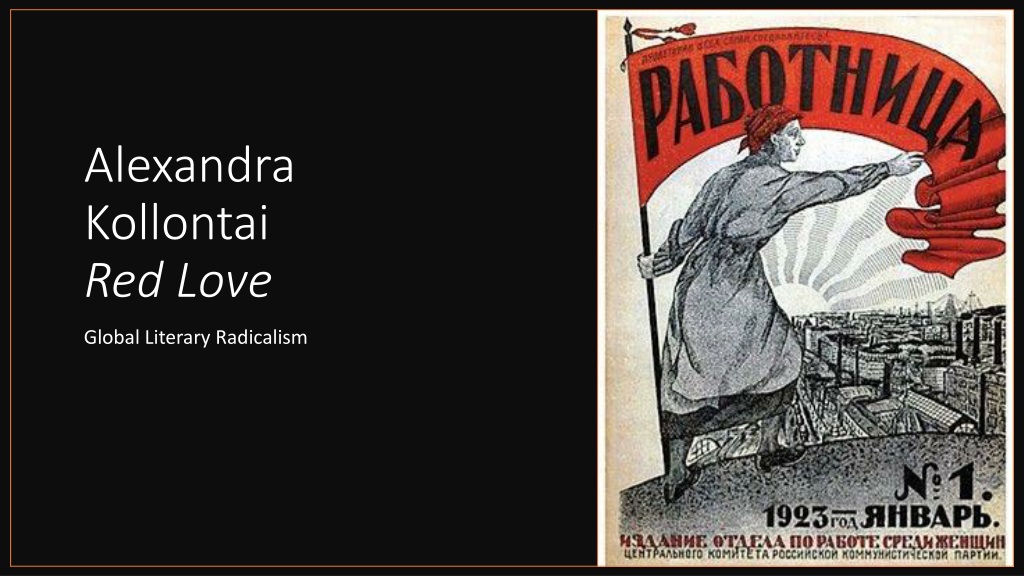

Replay
0 likes | 0 Views
Alexandra Kollontai, a revolutionary figure, challenges traditional views on relationships and women's status in the context of Soviet Russia post-civil war. Her concept of "Red Love" redefines intimate relationships, advocating for genuine connections free from societal norms. This narrative unfolds against a backdrop of global political and sexual revolutions, exploring themes of freedom, necessity, and social hieroglyphics. Kollontai's ideas on love and comradeship resonate even in contemporary society, urging a shift from transactional interactions to authentic connections.

E N D
Alexandra Kollontai Red Love Global Literary Radicalism
They were dismissed as mere autobiographical romances, indulging in unhealthy introspection and dangerously divorced from the "real" demands of society. At a time when Soviet Russia was facing enormous challenges connected with the reconstruction after the civil war and with the partial return to a market economy under the New Economic Policy (NEP), Kollontai's focus on domestic relationships and the status of women seemed narrow and excessively private” Birgitta Ingemanson, “The Political Function of Domestic Objects in the Fiction of Aleksandra Kollonta”i. Slavic Review. 1989;48(1), 71.
“Red Love emerged as a way of naming the various possibilities beyond or provocations to bourgeois sexual morality, and it took on a life of its own as it unfolded across the Pacific region—from the Soviet experiment to colonial, semicolonial, and imperialist Asia; white-settler Australia and the United States; and Mexico” (Ruth Barraclough, Heather Bowen-Struyk, and Paula Rabinowitz, “Introduction,” Red Love Across the Pacific Political and Sexual Revolutions of the Twentieth Century, Palgrave, 2015 xii)
“Instead of the conjugal slavery of the past, communist society offers women and men a free union which is strong in the comradeship which inspired it … -this so-called indissoluble marriage which at bottom was merely a fraud – has given place to the free and honest union of men and women who are lovers and comrades” (Alexandra Kollontai, “Communism and the Family” 1920)
“Although it may sound corny to our twenty- first-century ears, […] Kollontai [was] basically right. Intimate relationships that are relatively free from the transactional ethos of sexual economics theory are generally more honest, authentic, and, well, just better” (154).
“She pulled a sheaf of notes out of a pamphlet whose coloured cover showed a globe of the earth covered with chains broken by a red lightning bolt dropping from the milky Way. “Marx writes: “Value transforms every product of labour into a social hieroglyphic… For those who exchange their products, their own social action takes the form of the action of objects, which rule the producers instead of being ruled by them.” They believe themselves to be free because they are subject to the action of anonymous objects and not to men. They believe themselves free because they see no master over them. But “the reciprocal independence of person is achieved through a system of universal material dependence.”” “That was valid for the past. By becoming conscious of necessity we become free. Read Chapter XI of Anti-Duhring. By its understanding of necessary historical development, the proletariat, accomplishing what must be accomplished, passes from the realm of necessity to that of freedom. Read Chapter II and Part III.” “Xenia!” She knew what he was going to say, but with what words? She waited for these words and it seemed to her that her chest was bursting with joy. “Xenia, we are necessary to each other, and we are free because…” They kept silent until they reached the part of the garden where a great porphyry vase stands on a grey pedestal. Only there did he dare to ask her with awkward detachment: “Will you come, Xenia?”” Conquered City
”The meeting was over. Everybody was going away. The American stood before her. “May I introduce myself?” He told her his name and explained who he was. He pressed her hand; praised her speech. And again Vasya flushed. They began to talk, to argue. She was for the Bolsheviki, he in favor of the Anarchists. Going with the crowd, they reached the street. It was a rainy and windy night. A cab belonging to the Party was waiting. The American suggested that he take Vasya home. She agreed, and they climbed into the cab. It was dark in there, and the cab was narrow. They sat close together. The horse shied, and splashed in the mud-puddles with its hoofs. Vassilissa and Vladimir stopped disputing, sat there quiet and silent. Both grave and yet happy. They talked about trifles, about the rain, about the meeting that would take place the next day in the soap works, about the assembly at Party Headquarters. But their hearts were full of gladness. They were at Vasya’s house, and bid each other good- night. Both were sorry that they had to part so soon, but neither said so.” (35-6)
“Vassilissa was sitting at the window of her sleeping compartment. She was alone. Her neighbor, a ’Nep’ girl, very loud, dressed in silks, heavily perfumed, her ears weighed down with rings, had gone into the next compartment, where she was laughing loudly with her ‘cavaliers.’ She had given Vassilissa the cold shoulder, curling her lips contemptuously. ‘Beg pardon, dear, but you’re sitting on my shawl. You’ll crease it.’ […] As if she, the perfumed Nep-girl owned the compartment, and had let Vassilissa in only out of the kindness of her heart” (27)
“Spring was peeping through the window of Vassilissa’s attic, high up under the roof. The warm sun peeped in, and the spring sky, with its fleecy clouds, white, delicate, melting away. Next door was the roof of what had been a gentleman’s house, and now was used as the Mothers’ Home. Behind it lay a garden; the buds were beginning to swell. Spring, beloved spring was late, but it had come at last.” “You’ll see, we’ll live like fine people. I have a horse and a cow of my own, and an automobile always at my disposal. I have servants, so that you will have no work to do in the house, but can take a good rest. Spring is at its height here; the apple trees are in full bloom. Vasya, darling tomboy – we’ve never spent a spring together. But our life must always be like the spring” (21)
The Children’s Club “had been broken up at the time of the Nep. They had said it didn’t pay, and that the rooms were needed for other purposes. But where could the children do their lessons now? Their collections had been broken up and their library had been scattered; some of it had even been sold.” (262)
“ ‘we, conscious women workers, know that we have no special women's interests, that there should be no separate women;;s organizations. We are strong only so long as we are organized together into one fraternal proletarian family with all the workers in the struggle for socialism.’ Kollontai, on the other hand, urged women workers to look out for their own interests; she suggested that they should have their own representatives in the Constituent Assembly to raise issues about problems of motherhood, the family, prostitution, higher pay for women workers, day nurseries, and state support for mothers and children” Carol Eubanks Hayden, "The Zhenotdel and the Bolshevik Party." Russian History 3.2 (1976), 153
“I’ve worked in the Housing Bureau for two years. I’ve organized some community houses.” “Ah! That sounds interesting. You must teach us how to make the community houses self-supporting.” Vasya shook her head. “I can’t do that. When we wanted to become self-supporting everything went to pieces. A community house is on the order of a school to develop the Communist spirit.” “But, you see, this isn’t the time for such things. Give us a reasonable idea of the cost, a financial estimate, to take the burden of the state budget. But how can you want to combine the housing question with education? We have schools and universities for that.” The Chairman smiled a very superior smile that irritated Vasya. Suddenly she rose. “Good day, Comrade.” “Good-bye.” (26)
“Vasya didn’t dare move. She was afraid that this sudden joy, this bright, light-winged joy might fly out of her heart. It was as if she had never known or felt or understood the meaning of life before. But now she had grasped it. No despondency, no rushing about, no work, no joy, no pushing toward a goal, but life pure and simple. Life, like the life of the bee circling over the lilacs, like the life of the birds singing in the trees, like the life of the crickets chirping in the grass. Life! Life! Life! Why couldn’t one spend all one’s life among the lilacs? Why couldn’t man be like all of God’s creatures? ‘God’s?’ She was angry with herself. Since when was she thinking of God? That was the result of her idleness, of her burshui life, of Volodya’s good food. She might easily become a real Nep-girl if she continued this way” (125-6)
“Against the official stance that the NEP would make food and other products more widely available, Kollontai contrasted the skyrocketing unemployment among women and their concomitant dependence on men. She saw the beginnings of a vicious circle: Women were the first to lose their jobs and independence, this loss curtailed their political work, this curtailment helped bourgeois attitudes to blossom again, and these attitudes consolidated the notion of woman as man's most decorative possession.” (Ingemanson, “The Political Function of Domestic Objects in the Fiction of Aleksandra Kollontai,” Slavic Review. 1989;48(1), 81)
“Under Kerensky she was a candidate for the municipal Duma. The girls in the knitting- shop were proud of her. […] And she defended their interests. Her comrades sometimes rebuked her: ‘Can’t you forget your women? We have no time for them now – there are more important things.’ Vassilissa flared up, gave the Comrades a good berating, and quarrelled with the district secretary. But she did not withdraw her demands. ‘Why are women’s affairs less important? This idea is a habit with all of you. That’s why women are ‘backward.’ But you can’t have a revolution without the women. Woman is everything. Man does what she thinks and suggests to him. If you win over the women, half your work is done.’” (13)
“The proletarian ideology […] attempts to educate and encourage every member of the working class to be capable of responding to the distress and needs of other members of the class, of a sensitive understanding of others and a penetrating consciousness of the individual’s relationship to the collective. All these ‘warm emotions’ – sensitivity, compassion, sympathy and responsiveness – derive from one source: they are aspects of love, not in the narrow, sexual sense, but in the broad meaning of the word” (Kollontai, “Make Way for a Winged Eros” qtd in Christina Hetherington, Arise: Global Radicalism in the Era of the Mexican Revolution, University of California Press, 2022, 110).
